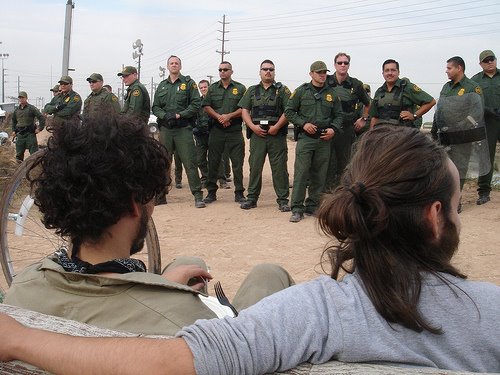Published: September 22, 2009
CALAIS, France — French authorities dismantled and bulldozed a camp for
undocumented migrants outside this English Channel port on Tuesday, rounding up
almost 300 Afghans, Pakistanis and others who had gathered there for years in
the hope of making clandestine journeys across the 22 miles of water to
Britain.
Starting at daybreak, hundreds of paramilitary officers scuffled with
migrants and campaigners from a group called No Borders as the authorities
closed down the camp, known as “the jungle” by migrants and Calais residents
alike for its location among the thorn bushes and sand dunes of Calais.
Hours later, yellow earth movers began flattening the makeshift shelters
used by hundreds of migrants seeking to sneak — or be smuggled by organized
gangs of traffickers — across the channel to Britain, which is itself seeking to
tighten border controls against unwanted migrants. Workers with chain saws moved
in to cut down the brush that had hidden the area from view.
The camp, with
huts and a mosque made of packing crates, blankets and tarpaulins, grew after
the closing of a Red Cross shelter for migrants in nearby Sangatte in late 2002.
The operation on Tuesday had been loudly signaled by the authorities, and many
migrants — possibly 1,000, according to news reports — had slipped away before
the raid.
With migrants outnumbered by 500 riot police officers, the
half-hour operation began at 7:40 a.m.. Under the gaze of about 200 waiting
journalists, police dragged or escorted away the mainly Afghan migrants who had
gathered in silence under a banner written in Pashto and English declaring: “The
jungle is our house, please don’t destroy it — if you do so then where is the
place to go?”
Some were led away in tears.
The immigration
minister, Eric Besson, defended the operation on RTL radio Tuesday. “This is not
a humanitarian camp,” he said. “It’s a base for human traffickers.”
At a news
conference in Calais, Mr. Besson said 276 people, including 135 teenagers, were
arrested and their fate would be determined on a “case by case” basis.
French authorities say some migrants will return to their countries of
origin, some will apply for asylum in France
and some will be expelled to Greece, the country where most of them entered the European
Union.
According to Pierre de Bousquet, the Pas de Calais prefect who
directed Tuesday’s action, shelter has been made available for those migrants
wishing to seek asylum, while minors will be taken to hostels for people under
18. Others will be held pending deportation.
Human rights bodies have urged
Paris not to return migrants to Greece, but Mr. Besson declined to comment
Tuesday on whether he had raised the issue with his Greek counterpart on a visit
to the country on Friday.
Khaled Hadarhy, a 21-year-old Afghan, was rounded
up along with two friends who were 16 and 17. “We are all young, but we look old
because the jungle has made us old,” said Mr. Hadarhy, a former policeman from
Helmand Province who has been in Calais for four months.
“The police will
come and we will do what they tell us,” said Exel Palav, 20, from
Afghanistan.
Pierre Henry, president of a campaign group called France Terre
d’Asile, said Tuesday’s operation was an effort to make the migrants disappear
“like a coin in a three-cup magic trick,” displacing them to neighboring Belgium
or the Netherlands.
“The operation in Calais won’t stop departures from
Kabul,” he said. “The smugglers will find other routes that are more complex and
more dangerous.”
The move to eliminate the tents and ramshackle housing
around the port is designed to halt migrants without papers from getting into
Britain, and to crack down on the smuggling networks that assist
them.
“Smugglers will not lay down the law,” the immigration minister, Mr.
Besson, said last Wednesday. He first announced the plan to dismantle the camp
in April, responding to complaints from local businesses.
The closure took
place as European countries increasingly use force to crack down on unwanted
migrants. On July 12, Greece eliminated a makeshift camp in the port city of
Patras; in May, Italy struck a controversial accord with Libya allowing it to
turn back migrants’ boats in the Mediterranean. The European Union estimates
that 500,000 people cross its borders without papers each year.
Read full article: http://www.nytimes.com/2009/09/23/world/europe/23france.html

No comments:
Post a Comment